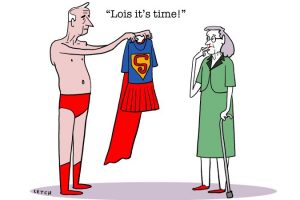Should my partner cash out my super when I die?

My wife and I are both 85. We rent as we do not own a home. I have advised my wife to convert my $1 million super account to cash in a bank account in the event of my death. I hope this will save tax and simplify her will. Will she receive any Centrelink entitlements?
You really need to sit down with a good estate-planning lawyer and a financial adviser to get your affairs in order sooner rather than later. You are already close to the non-home-owner, couples, Centrelink assets-test cut-off limit for the age pension, and your wife will be over it if she just cashes in the super and puts the money in the bank.
Transferring your super to your partner when you die can have its fair share of pitfalls.Credit:Simon Letch
One option may be to put some specific bequests to other beneficiaries in your will, which could take her assets under the $846,750 cut-off point for a non-home-owner single person. Alternatively, you could make her a reversionary beneficiary of your superannuation fund, in which case the money would be held by her in superannuation, and all the decisions made by expert fund managers.
This could mean no age pension for her, but she would certainly get the Commonwealth Seniors Health Card and all the benefits that go with that. She would certainly not be destitute.
Would you know if the amount that is required to be withdrawn from superannuation in pension mode will be reverting to the normal rates for the ’23/’24 financial year? I am aged 77 and the reduced rate of 3 per cent has been great for our pension funds, but I fear that all good things will come to an end on June 30.
I’ve not heard anything at this stage about whether these minimum pension reductions will continue into the 2023-’24 financial year. We may hear more as we get closer to the federal budget in May. Given the constant tinkering with superannuation rules, it’s anybody’s guess.
My wife has shares in trust for our daughter through an online broker. She turns 18 soon and I am not sure of my options. Am I obligated to transfer the shares to her? If so, what are the steps involved?
It would appear there is no formal trust deed. In this case, the trustee could do pretty much anything they liked, as long as they were acting in the best interests of your daughter, who is the beneficiary of the trust. You would need to liaise with your accountant about the possibility of capital gains tax, although this should be nil if, at all stages, the parents acted as trustees and did not intermingle the money with their own funds.
I am 49 with grown children. I own my house outright and have $1.4 million in superannuation. I have also accumulated an Australian share portfolio worth $900,000. The margin loan on this is $220,000 and I have recycled that debt at a lower interest rate backed by a mortgage on my house. I work in a well-paying job and earn approximately $146,000 per annum. My dividends add up to approximately $60,000 including franking credits. What I need to know is what happens to any money over the $1.7 million transfer cap below the age of 60 and after 60. What can you do with it once you retire – is it worth keeping it in superannuation?
The transfer cap purely limits the amount you can transfer to superannuation pension mode, but this can’t happen until you reach your preservation age, which means your superannuation will simply keep growing in the present environment until that time.
You are at least 10 years from that and I predict there could be many changes to the rules in that time. Under the present rules, when you retire, any money in superannuation exceeding the amount you can transfer to pension mode using the transfer balance cap will sit in a separate accumulation fund, which is presently taxed at 15 per cent. Alternatively, you could make withdrawals from it and use the money as you wish. Naturally, you would need to seek advice when you reach your preservation age, but under the current rules it is a great investment environment.
- Advice given in this article is general in nature and is not intended to influence readers’ decisions about investing or financial products. They should always seek their own professional advice that takes into account their own personal circumstances before making any financial decisions.
Noel Whittaker is the author of Retirement Made Simple and numerous other books on personal finance. Email: [email protected]
The Business Briefing newsletter delivers major stories, exclusive coverage and expert opinion. Sign up to get it every weekday morning.
Most Viewed in Money
From our partners
Source: Read Full Article

